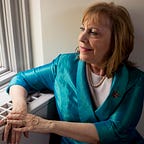Climbing Out Of Division To Reach Common Ground
One of my not-so-guilty pleasures is watching Masterpiece on PBS-TV. I just finished “The Durrells in Corfu,” based on the memoir by conservationist Gerald Durrell, the brother of novelist Lawrence Durrell. It’s the story of their indominable, widowed mother Luisa, who moves the family from gray, tradition-bound Bournemouth, England to the lively, sun-drenched Greek island of Corfu.
In one memorable scene, the sole Durrell daughter, Margo, is returning to Corfu from a visit to England. She settles into a compartment where her fellow passengers greet her “Hello” with Bonjour, Buongiorno, Guten tag and Kalimera. “How delightfully European,” Margo muses.
Europe, though, is on the verge of war. Tensions soon surface. The Frenchman says Germans are “warlike.” The German nun in the compartment counters that Napoleon was a conqueror. The young Greek complains that the British can’t be trusted. Finally, the Italian passenger observes, “The history of the world is a history of aggression. We are all guilty.”
The part I love is when Margo diffuses the situation by opening her lunch box and asking, “Would anyone like a sandwich?”
It’s a reflection of how quick we are to judge, and just as quick to find common ground over our shared human needs — like eating.
I relate this scene because I can’t seem to stop thinking of a disturbing interview I saw on the news in which a woman attending a Trump rally in Iowa nonchalantly told her interviewer, “A civil war is coming. That’s what it’s coming to.” Behind her, others nodded their agreement.
Why would anyone speak so cavalierly about such a dire prospect? Have they not read about the slaughter at Antietam and Gettysburg, or seen a Civil War documentary? The conflict left 600,000 dead; some 22,717 died, were wounded, or reported missing in the battle of Antietam alone.
Wouldn’t one want to do anything possible to prevent another such horror?
In preparing to guide a retreat, I have been reading the writings of Howard Thurman, a great 20th century African American mystic and visionary. Thurman believed that authentic religious experience leads to a sense of oneness, a oneness that is a reflection of God. For Thurman, community is the end goal of life.
In 1944, with war in Europe and the Pacific still raging, he left a tenured position at Howard University in Washington D.C. to found the Church for the Fellowship of All Peoples in San Francisco. It is considered the first inter-racial, inter-denominational church in the U.S. The Fellowship Church used art, music, poetry and dance to draw attention to our common human yearnings.
Asked what the ecumenical, inter-racial experience of his church had taught him, Thurman said, “Meaningful and creative experiences between peoples can be more compelling than all the ideas, concepts, faiths, fears, ideologies and prejudices that divide them.”
When those common experiences are sustained over time, Thurman said, “any barrier that separates one person from another can be undermined and eliminated.”
At the same time as I’ve been delving into Thurman, I’ve also been reading Michael Curry’s recent book, Love Is The Way, in preparation for a talk I was asked to give to the Word & Life spirituality group of Santa Barbara. As presiding bishop of the U.S. Episcopal Church, Curry has heavy-duty experience navigating conflicts within his denomination, as well as the festering divisions in our country over politics, race and social issues.
To begin a fruitful dialogue, Curry says, “You have to shift the conversation to higher ground — above and beyond politics … Instead, we search for values and principles that we share. In that higher moral and spiritual ground, we may find genuine common ground.”
And when we reach that common ground, it usually leads us to the common good — a prospect too often lost amid recent heated arguments over individual rights.
Curry offers a few practical steps to start downt his road:
- Identify shared moral and spiritual principles on which you agree
- Share your personal story about how those values and principles became important to you
- Seek to apply those values to current challenges and identify commonalities
As we head toward that Thanksgiving Day table where we might encounter some difficult and heated discussions, Curry offers a blueprint for climbing out of our divisions by heading toward common ground. What can we agree on? What values do we share?
And, please, no more talk about a coming civil war.
